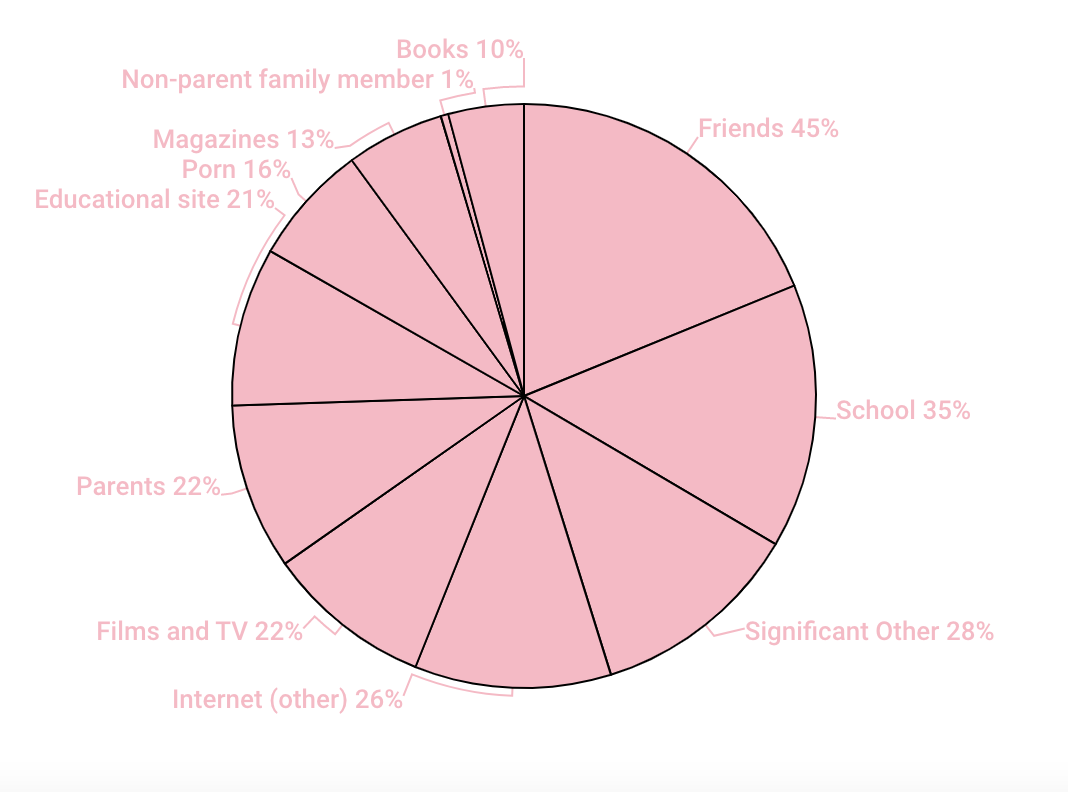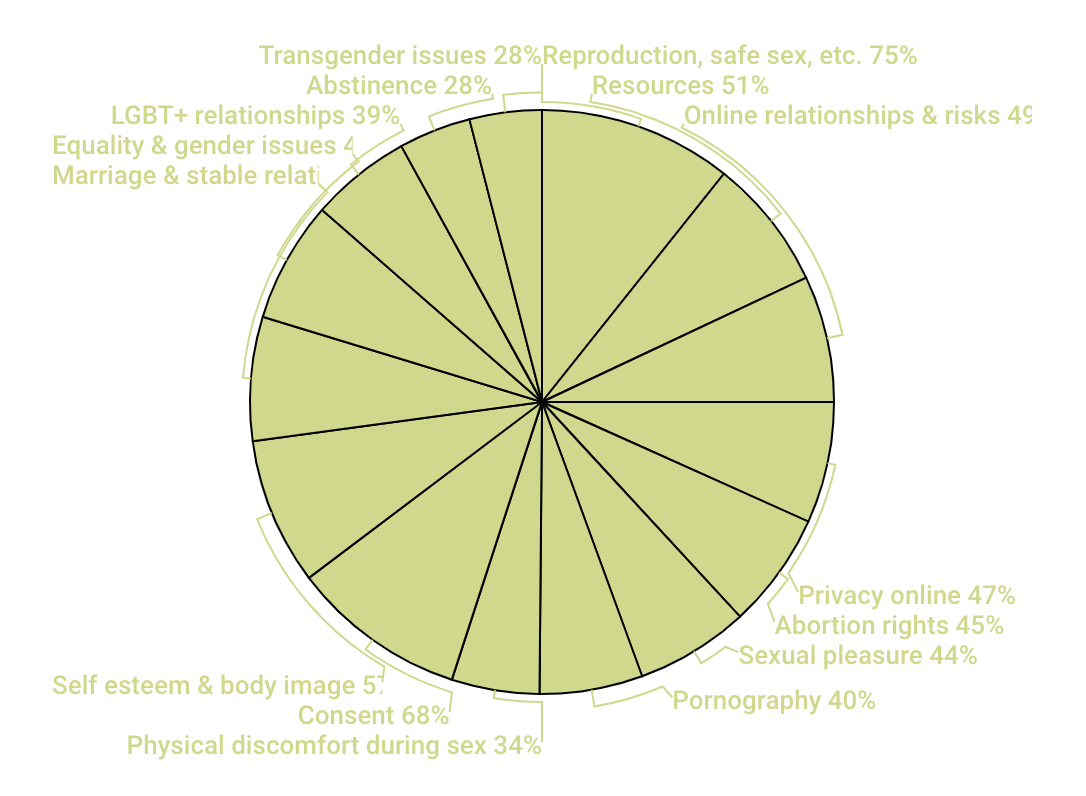It’s more than just the birds and the bees: comprehensive sex education in Ohio
Graphic by Claire Del Vita.
In light of the overturning of Roe v. Wade last June, the #MeToo and Times Up movements and society deep into the fourth wave of feminism, the discussion of comprehensive sex education (CSE) is more lively than ever. Molly Wales, Athens City School District’s nurse, hopes to bring awareness to the importance of and need for national implementation of CSE.
CSE is “developmentally and culturally responsive, science-based and medically accurate information on a broad set of topics related to sexuality, including human development, relationships, personal skills, sexual health and society and culture,” according to the Sexuality Information and Education Council of the United States (SEICUS).
Very few states offer sex education that is considered comprehensive, but the Real Education for Healthy Youth Act (HR 3312) would create federal funding for and the promotion and implementation of CSE. HR 3312 was introduced in 2021 by Rep. Barbara Lee and Sen. Cory Booker, but has yet to be passed.
While most states offer education programs on sex and relationship health to students, only 30 states mandate it and seven of those have laws that include education on sexually transmitted infections and healthy relationships. Ohio is not one of them.
According to the Sex Education Collaborative (SEC), Ohio schools teach sexual education with an emphasis on abstinence. There is no requirement for the lessons to be comprehensive, students are not required to learn about consent and there does not have to be any instruction on sexual orientation or gender identity, the SEC also says.
“Which were the three main sources where you got most of your information about sex and relationships? Please select a maximum of three answers.” Study from the Institute for Public Policy Research. Graphic by Claire Del Vita.
Ohio legislators are pushing for a bill that would restrict this kind of education entirely. HB 616, often referred to as the “Don’t Say Gay” bill, if passed, would ban instruction on sexual orientation, gender identity and Critical Race Theory.
LGBTQ+ and nonbinary youth are often left out of the narrative. Only seven states—California, Colorado, New Jersey, Oregon, Rhode Island and Washington—and Washington D.C. require sex education to be inclusive of LGBT youth, according to SEICUS. Five others—Delaware, Iowa, Massachusetts, South Carolina and Wisconsin—require some instruction of sexual orientation and gender identity.
The lack of inclusive sex and relationship education for LGBTQ youth reinforces heteronormativity and gender stereotypes and increases the likelihood that they will be bullied or discriminated against, according to the LGBTQ+ YOUTH NEED report. CSE entails that lessons and the language used must be inclusive of LGBTQ and nonbinary youth. It would also distance from the longstanding patriarchal view that currently surrounds sex and relationship education, allowing for focus on female pleasure as well, according to the American College of Obstetricians and Gynecologists.
Gabbie Buhay, a junior studying psychology at Ohio University, shared that most of what she knows now about sex and relationships she either taught herself, learned from friends or media.
This is a common issue for many students who have found themselves let down by their sex education and having to teach themselves more than they should, especially amongst LGBTQ individuals. According to a study by the Institute for Public Policy Research, only 35% of 500 respondents said that school was their main source of sex and relationship education. 53% of respondents to the same survey believed that “all children have a right to education about sex and relationships”, 50% believe that “sex education should be on the curriculum” and 44% also believe that “relationship education should be on the curriculum”.
“How would you rate the sex and relationship education received through your school? Please rate on a scale from 1 to 7, where 1 = it was inadequate and 7 = it was excellent and taught me everything I needed to know.“ Study from the Institute for Public Policy Research. Graphic by Claire Del Vita.
Buhay works in the Ohio U Women’s Center, a place not just for women, but for students of all identities to have a safe space on campus. She emphasized the importance that inclusive language has in both the realms of sex, relationships and even her job.
“I think it’s more important than ever to be aware of inclusive language, even when it comes to sex, because it can make or break someone’s concept of themselves or other people,” Buhay said. “My college education has really helped me expand my already existing knowledge and apply it to my job.”
Athens City School District follows Ohio’s guidelines but Wales, the district’s school nurse, created a comprehensive curriculum for students beginning in fourth grade. Her program was approved by the Athens City School District’s Board of Education and implemented in 2018. While she cannot go outside of what the board approved, Wales is always changing how she teaches as times change and as she learns more from her students.
“I'm learning more as I teach, I get a much better idea of what my students need in real life. You know, I'm their parents' age, so I can't pretend to actually know what sexuality is like for a young person,” Wales said.
Wales also attends the National Sex Ed Conference every year. The Center for Sex Education is Planned Parenthood of New Jersey’s national education division. Aside from hosting the conference, the center publishes sex education materials and provides membership services through the Sex Ed Network, which offers downloadable lesson plans.
“I am constantly updating and just trying to keep everything evidence-informed, in terms of current evidence, and then making sure it actually reflects the needs of my students instead of just what I think they need to know,” Wales said.
Under Ohio guidelines, students are also taught that adoption is the best option for unwanted pregnancies. Parents can even opt their children out of receiving any sexual or relationship education. These are all outlined in Ohio Revised Code sections 3313.60 and 3313.6011.
There are many forms of contraception available that prevent pregnancy. Most contraceptives are geared towards women or vagina-owning individuals, like the pill, intrauterine devices (IUDs), implants, patches or vaginal contraceptive rings. There are less options for men or penis-having individuals who either can use a condom or get a vasectomy. Contrary to belief, vasectomies are meant to be irreversible, so this should be noted when considering this method. The Center for Disease Control provides a list of birth control options available in the U.S., many of which are covered by insurance.
“There are lots of negative ramifications associated with what our sex ed in the state is, it does a total disservice,” Bria Brown, a licensed professional counselor at the Ohio Center for Relationship and Sexual Health in Cleveland, said. “People are not getting the information they need.”
She compared it to not getting the proper information on healthy eating. If a person is not taught about the benefits of eating fruits and vegetables, they could go their whole life eating poorly.
“If you don’t know how sexuality works, or how that functions, or what is going to be best for you and learning about consent and these other important things. Well then, you’re just operating from what you don’t know, which is the reality for many people.”
In Athens city schools, the conversation over what sex is, consent and healthy communication within relationships are introduced in middle school. While puberty is discussed with fourth and fifth graders, Wales explains menstruation to sixth graders. She also discusses vaginal sex and how fertilization occurs with her students at this age, however she goes more in-depth with these topics once they enter the eighth grade. Peer educators from Athens High School help Wales teach to this level.
“We also go a lot more into sexual decision making, how values play into sexual decision making, the talk about healthy and unhealthy reasons to engage in sexual activity,” Wales said.
“What do young people need to know about, discuss or understand to have healthy, happy and positive relationships? Please select a maximum of three answers.” Study from the Institute for Public Policy Research. Graphic by Claire Del Vita.
Eighth graders are taught about methods of birth control, protection from sexually transmitted diseases, local testing and contraception resources, and sexual harassment and abuse. Wales emphasizes to middle schoolers that pornography is not a healthy or accurate representation of sex and relationships. A flex credit course is available to high schoolers where they meet weekly to deep dive into different topics. Each year Wales expands on previously discussed subject matter with her students based on what will be most relevant to them at that point in their life.
“It is not our goal to tell them what to do or to teach them values, rather just simply give them the information they need to make healthy choices for themselves, whatever path that they're on,” Wales said.
Brown emphasized the close relationship between sexual, mental and relational health. The World Health Organization even includes mental health in its definition of sexual health, “a state of physical, emotional, mental and social well-being in relation to sexuality.” If a person has previous qualms with their mental health, including anxiety, depression or other stressors, it can have an effect on their sex life.
“Being able to feel relaxed in our bodies is actually essential to our sexual functioning, which is something that none of us are really taught. We’re actually taught the opposite, that it’s some kind of performance,” Brown said.
Depression and anxiety can lower a person’s libido, or their desire to have sex and affect sexual performance, according to Resources to Recover. Alternatively, a healthy relationship with sex can in turn have a positive impact on mental health. Physical intimacy can reduce stress and research indicates that intercourse can release oxytocin and similar mood-boosting, naturally occurring chemicals.
“People knowing that they can be calm in their body, that alone, can absolutely solve the problem for a lot of clients and we may not even have to move on to intensive therapy,” Brown said. “A lot of times just giving education and filling in those gaps for people, dispelling myths, can be enough to help them work through a lot of challenges.”
CSE is needed to achieve this level of sexual and relationship clarity for many individuals, according to the Journal of Adolescent Health. Both Brown and Buhay agree that there should not be an age limit to learning about our bodies, healthy relationships and sexual wellness. Brown explained that there are certain conversations that are best to be had at an older age, but there is no shame in teaching a child about body changes and boundaries as early as their parents desire.
“Sexual health is health,” Brown said. “If we don’t know about our bodies and how they work and the importance of somebody asking for consent and us enthusiastically giving it, then that is so detrimental to our overall well-being.”
CSE not only promotes health decision-making in children, teens and young adults, it also keeps them safe from abuse, coercion, sexually transmitted infections and unwanted pregnancies, according to the United Nations AIDS website.
“There's a fundamental lack of factual knowledge that is leaving our young people unsafe, so I really do strongly believe in giving them information in a novel and medically accurate way that they can then take in the context of their own lives and know how to make healthy choices,” Wales said.




